Master Kong Confucius: Great Philosopher And ‘Teacher Of All Teachers’ Ahead Of His Time
A. Sutherland - AncientPages.com - In China, he is mostly known as Master Kong or Kong Fuzi, we know him as Confucius.
Like the other great teachers of Central Asia, he was a contemporary of Buddha, Mahivira, and Lao Tzu.
He was one of the most influential Chinese thinkers, well known for his work in social relationships.
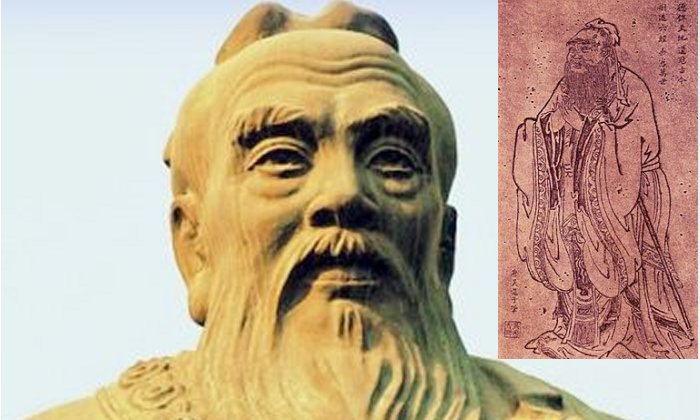 The philosophy of Confucius—Confucianism—emphasized personal and governmental morality, the correctness of social relationships, justice, kindness, and sincerity. Confucianism was part of the Chinese social fabric and way of life; to Confucians, everyday life was the arena of religion.
The philosophy of Confucius—Confucianism—emphasized personal and governmental morality, the correctness of social relationships, justice, kindness, and sincerity. Confucianism was part of the Chinese social fabric and way of life; to Confucians, everyday life was the arena of religion.
A system of thinking, Confucianism is named for him, and supports his Five Relationships: father-to-son, brother-to-brother, husband-to-wife, peer-to-peer, and king-to-subject.
Confucius - a fifth-century BC philosopher - believed that they bring peace and prosperity to all people.
He is considered the “teacher of all teachers,” and his teachings known as “Confucianism” were taught in schools and had a great impact on both the past and present Chinese culture. However, among his contemporaries, he was a controversial teacher much ahead of his time.
Confucius did not consider himself a ‘creator’ but rather a ‘transmitter’ of these ancient moral traditions. His school taught writing, rules of behavior, and basic knowledge.
What makes Confucius so special is that he did not claim that his doctrine comes from divine inspiration or another source inaccessible to ordinary people.
Legend has it that when he died, his students mourned him for three years, and the most faithful of them Tzu Kung – a businessman, an accomplished speaker, a good leader, who, probably led his own Confucian school at some point – visited the master’s grave in Qufu for six years saying: “Since the beginning of mankind until now there wasn’t a man equal to Confucius.”
Confucius’ simple, undogmatic maxims are still popular. He argued that the moral sense in man is the equivalent of the cosmic order of nature. He never referred to the supernatural.
Confucianism is not a religion, but rather a system of ethics, learning how to be a good, moderate, socially, and ethically valuable man.
He was born in 551 BC in the State of Lu, (known today as Qufu in Shandong Province) in an impoverished aristocratic family. He was born in uncertain times also characterized as an era of philosophical creativity. The rulers and subjects of the various regions sought both knowledge and power.
His father was a military officer and died when the son was 3 years old. Mother raised him alone. Confucius knew poverty and endured a poverty-stricken and humiliating youth but despite a hard life, he dedicated himself to study at the age of 15.
Confucius – an intellect with a noble morality – pursued truth, propriety, righteousness, wisdom, and trustworthiness, kindness and perfection throughout his life, and his success and failure were largely due to his character.
Some of his famous words are:
“Everything has its beauty but not everyone sees it”
“Our greatest glory is not in never falling, but in getting up every time we do”.
Or: “Forget injuries, never forget kindness”.
Written by – A. Sutherland AncientPages.com Staff Writer
Copyright © AncientPages.com All rights reserved. This material may not be published, broadcast, rewritten or redistributed in whole or part without the express written permission of AncientPages.com
Expand for referencesMore From Ancient Pages
-
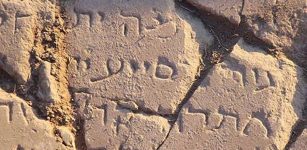 1,500-Year-Old Marble Slab With Inscription Found On East Coast Of Sea Of Galilee
Archaeology | Dec 18, 2015
1,500-Year-Old Marble Slab With Inscription Found On East Coast Of Sea Of Galilee
Archaeology | Dec 18, 2015 -
 Unexplained Teleportation Cases Of People – Dangerous Fog – Part 2
Ancient Mysteries | Oct 2, 2019
Unexplained Teleportation Cases Of People – Dangerous Fog – Part 2
Ancient Mysteries | Oct 2, 2019 -
 Vatican Secrets – Extraterrestrial Life And Genetically Engineering Of Humans By Advanced Alien Species
Featured Stories | Oct 6, 2018
Vatican Secrets – Extraterrestrial Life And Genetically Engineering Of Humans By Advanced Alien Species
Featured Stories | Oct 6, 2018 -
 Mystery Surrounds Newly Discovered Bronze Age Burial In Southwest England
Archaeology | May 21, 2018
Mystery Surrounds Newly Discovered Bronze Age Burial In Southwest England
Archaeology | May 21, 2018 -
 Mysterious Underground City In Brazil Could Re-Write Ancient History – Unexplained Artifacts And Skeletons – Part 1
Ancient Mysteries | Jan 23, 2022
Mysterious Underground City In Brazil Could Re-Write Ancient History – Unexplained Artifacts And Skeletons – Part 1
Ancient Mysteries | Jan 23, 2022 -
 Find Out Which Indigenous Lands You Live On With This Interactive Map Covering The Whole World
Places | Jan 17, 2023
Find Out Which Indigenous Lands You Live On With This Interactive Map Covering The Whole World
Places | Jan 17, 2023 -
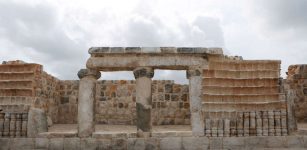 Ancient Mayan City Filled With Palaces, Pyramids And Plazas Discovered On Construction Site In Mexico
Archaeology | May 27, 2022
Ancient Mayan City Filled With Palaces, Pyramids And Plazas Discovered On Construction Site In Mexico
Archaeology | May 27, 2022 -
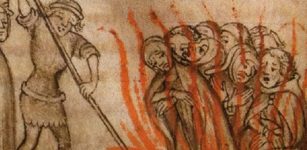 On This Day In History: Knights Templar Arrested – Oct 13, 1307
News | Oct 13, 2015
On This Day In History: Knights Templar Arrested – Oct 13, 1307
News | Oct 13, 2015 -
 Legend Of Kitezh – Ancient Underwater City And Its Doomsday Prophecy
Featured Stories | Mar 14, 2017
Legend Of Kitezh – Ancient Underwater City And Its Doomsday Prophecy
Featured Stories | Mar 14, 2017 -
 Unexpected Neanderthal Behavior In Spain’s Southern Pyrenees – Revealed
Archaeology | Aug 14, 2024
Unexpected Neanderthal Behavior In Spain’s Southern Pyrenees – Revealed
Archaeology | Aug 14, 2024 -
 ‘Exceptional’ Ancient Roman Bath Complex Discovered In Mérida, Spain
Archaeology | Aug 21, 2023
‘Exceptional’ Ancient Roman Bath Complex Discovered In Mérida, Spain
Archaeology | Aug 21, 2023 -
 Fylgja – Norse Guardian Spirit Was Deeply Respected
Norse Mythology | Apr 1, 2024
Fylgja – Norse Guardian Spirit Was Deeply Respected
Norse Mythology | Apr 1, 2024 -
 Oldest Canoe Ever Discovered In Maine – It Dates To 1280-1380 A.D
Archaeology | Jun 13, 2019
Oldest Canoe Ever Discovered In Maine – It Dates To 1280-1380 A.D
Archaeology | Jun 13, 2019 -
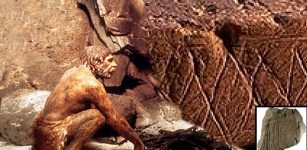 Is The Hashtag World’s Oldest Symbol And First Communication Attempt?
Ancient Symbols | Apr 27, 2018
Is The Hashtag World’s Oldest Symbol And First Communication Attempt?
Ancient Symbols | Apr 27, 2018 -
 New Treasures Found On The Legendary Shipwreck San José Near Colombia
Archaeology | Aug 9, 2024
New Treasures Found On The Legendary Shipwreck San José Near Colombia
Archaeology | Aug 9, 2024 -
 Mysterious Ancient Female Society Discovered – What Happened To All The Men? Archaeologists Wonder
Featured Stories | Oct 3, 2024
Mysterious Ancient Female Society Discovered – What Happened To All The Men? Archaeologists Wonder
Featured Stories | Oct 3, 2024 -
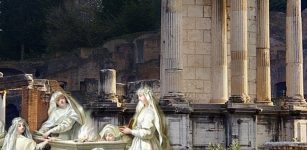 Vesta And Her Six Vestal Virgins – Highly Venerated Goddess Of Hearth And Family
Featured Stories | Dec 24, 2019
Vesta And Her Six Vestal Virgins – Highly Venerated Goddess Of Hearth And Family
Featured Stories | Dec 24, 2019 -
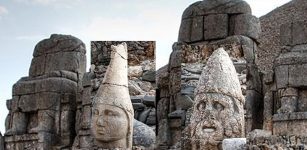 Mount Nemrut: ‘Throne Of The Gods’ – Mysterious Royal Tomb Surrounded By Gigantic Sculptures
Civilizations | Nov 16, 2018
Mount Nemrut: ‘Throne Of The Gods’ – Mysterious Royal Tomb Surrounded By Gigantic Sculptures
Civilizations | Nov 16, 2018 -
 Three Fun Paradoxes Created By Ancient Greek Philosophers To Puzzle Over
Featured Stories | Aug 28, 2024
Three Fun Paradoxes Created By Ancient Greek Philosophers To Puzzle Over
Featured Stories | Aug 28, 2024 -
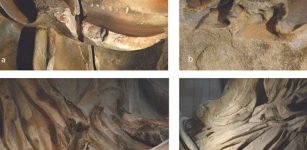 True Colors Of The Parthenon Sculptures Revealed In New Study
Artifacts | Oct 12, 2023
True Colors Of The Parthenon Sculptures Revealed In New Study
Artifacts | Oct 12, 2023

